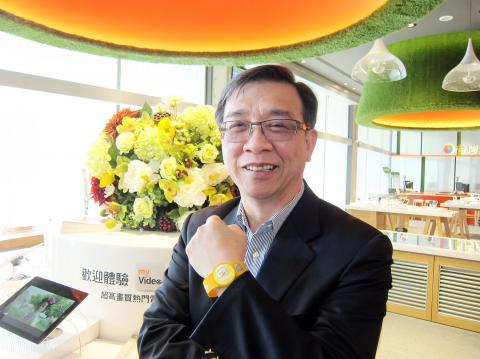Taiwan Mobile Co (台灣大) has considered the nation’s graying population with a near-field communication (NFC)-capable smart bracelet that could help senior citizens find their way home.
When lost, wearers can swipe the bracelets over any NFC-enabled smartphone to alert authorities to their location, pinpointed by GPS, the nation’s second-largest mobile carrier said yesterday.
“This marks the first NFC-based electronic tagging feature in a smart bracelet in Taiwan, and it could raise people’s willingness to help find senior citizens who get lost,” Taiwan Mobile president James Cheng (鄭光遠) told a press conference.

Photo: Wang Yi-hung, Taipei Times
The company plans to distribute 4,000 bracelets for free in Taipei and New Taipei City in partnership with the Foundation for the Welfare of the Elderly, and in Pingtung County with the Bjorgaas Social Welfare Foundation.
The bracelets could help the 200,000 Taiwanese seniors who have Alzheimer’s disease, Cheng said.
The Foundation for the Welfare of the Elderly has said that about 58 percent of people with Alzheimer’s who become lost are found within a short period of time, but the technology in the bracelet could increase that number to 100 percent, Cheng said.
Cheng also mentioned Taiwan Mobile’s plans to sell fourth-generation (4G) smartphones that support the nation’s unique 700 MHz frequency, saying the company would launch 10 smartphone models capable of using the frequency in the third quarter of this year, when its 4G network is due to be inaugurated.
The phones include a Taiwan Mobile-branded 4G phone made by Hon Hai Precision Industry Co (鴻海), the main manufacturer of Apple Inc’s iPhones and iPads.
Taiwan Mobile will increase its 700 MHz 4G phone selections to as many as 40 models by the end of the year, thanks to 4G LTE chips launched by suppliers such as Qualcomm Inc, Cheng said.

Nvidia Corp chief executive officer Jensen Huang (黃仁勳) on Monday introduced the company’s latest supercomputer platform, featuring six new chips made by Taiwan Semiconductor Manufacturing Co (TSMC, 台積電), saying that it is now “in full production.” “If Vera Rubin is going to be in time for this year, it must be in production by now, and so, today I can tell you that Vera Rubin is in full production,” Huang said during his keynote speech at CES in Las Vegas. The rollout of six concurrent chips for Vera Rubin — the company’s next-generation artificial intelligence (AI) computing platform — marks a strategic

REVENUE PERFORMANCE: Cloud and network products, and electronic components saw strong increases, while smart consumer electronics and computing products fell Hon Hai Precision Industry Co (鴻海精密) yesterday posted 26.51 percent quarterly growth in revenue for last quarter to NT$2.6 trillion (US$82.44 billion), the strongest on record for the period and above expectations, but the company forecast a slight revenue dip this quarter due to seasonal factors. On an annual basis, revenue last quarter grew 22.07 percent, the company said. Analysts on average estimated about NT$2.4 trillion increase. Hon Hai, which assembles servers for Nvidia Corp and iPhones for Apple Inc, is expanding its capacity in the US, adding artificial intelligence (AI) server production in Wisconsin and Texas, where it operates established campuses. This

US President Donald Trump on Friday blocked US photonics firm HieFo Corp’s US$3 million acquisition of assets in New Jersey-based aerospace and defense specialist Emcore Corp, citing national security and China-related concerns. In an order released by the White House, Trump said HieFo was “controlled by a citizen of the People’s Republic of China” and that its 2024 acquisition of Emcore’s businesses led the US president to believe that it might “take action that threatens to impair the national security of the United States.” The order did not name the person or detail Trump’s concerns. “The Transaction is hereby prohibited,”

Garment maker Makalot Industrial Co (聚陽) yesterday reported lower-than-expected fourth-quarter revenue of NT$7.93 billion (US$251.44 million), down 9.48 percent from NT$8.76 billion a year earlier. On a quarterly basis, revenue fell 10.83 percent from NT$8.89 billion, company data showed. The figure was also lower than market expectations of NT$8.05 billion, according to data compiled by Yuanta Securities Investment and Consulting Co (元大投顧), which had projected NT$8.22 billion. Makalot’s revenue this quarter would likely increase by a mid-teens percentage as the industry is entering its high season, Yuanta said. Overall, Makalot’s revenue last year totaled NT$34.43 billion, down 3.08 percent from its record NT$35.52